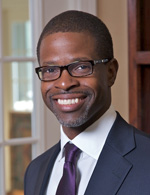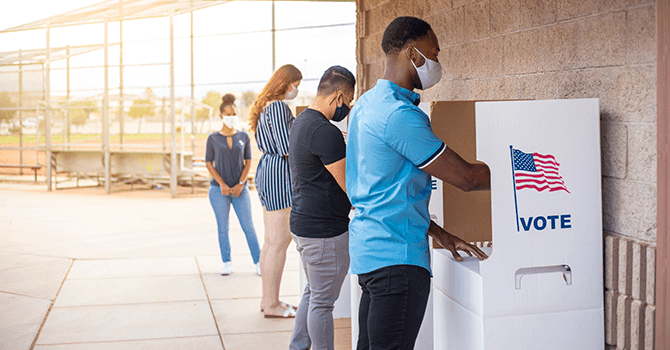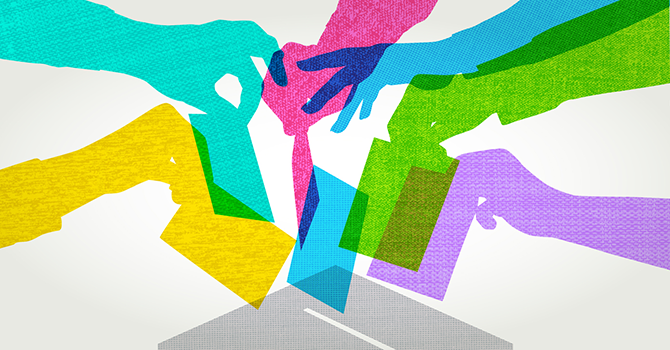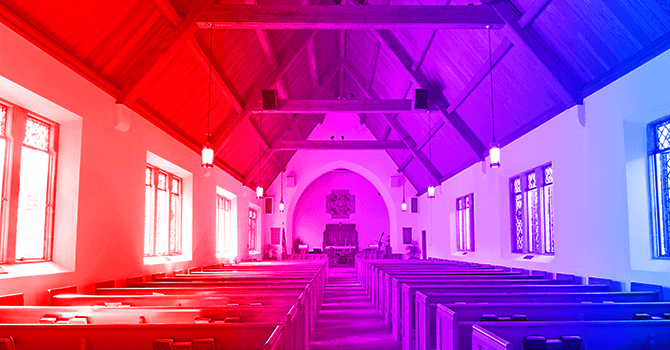Editor's note: This is one in a series of pieces from a variety of perspectives addressing the 2020 election.
With the general election only weeks away, traditional efforts to get out the vote are facing challenges in this COVID-complicated season. For some Black churches, Souls to the Polls has long been one way to encourage voter turnout, including going as a congregation to take part in early voting after a Sunday service.
But what happens when church members are scattered because that service is online and they may not even feel safe casting their ballots in person? As November approaches, the Rev. Prince Rivers, the senior pastor of Union Baptist Church in Durham, North Carolina, is one faith leader navigating how to encourage his congregation’s members to fulfill their civic duty.
 Rivers spoke with Faith & Leadership’s Aleta Payne about the history of Souls to the Polls, the importance within Black churches of voting and ways that get-out-the-vote efforts will continue, even in a pandemic.
Rivers spoke with Faith & Leadership’s Aleta Payne about the history of Souls to the Polls, the importance within Black churches of voting and ways that get-out-the-vote efforts will continue, even in a pandemic.
“It is challenging but not impossible,” Rivers said.
The following is an edited transcript.
Faith & Leadership: Can you describe the tradition of Souls to the Polls in historically African American congregations?
Prince Rivers: Souls to the Polls grows out of a tradition of being very concerned about mobilizing African Americans to exercise their civic responsibility to vote in communities that have been marginalized. Sometimes, you need to build momentum in order to get the populace to the polls. If you think about the language of Souls to the Polls, this is helping people understand not only their civic responsibility but also their faithful responsibility.
The churches, especially in areas where there is early voting, would often have a rally on a Sunday or a Saturday to encourage the people to exercise their responsibility and literally go to the polls as a group so that people could exercise their right to vote. When you look at that term more broadly, it may not always be a rally, but it is certainly the practice of emphasizing and mobilizing and organizing people to be registered to vote and then to actually vote on Election Day.
F&L: Can you talk a bit about the significant role African American clergy have played, and Black faith leaders, in securing for people of color the right to vote?
PR: The most obvious example would be the work led by Dr. Martin Luther King and his colleagues during the civil rights movement of the 1950s and 1960s, where people literally marched. They led protests. They led boycotts in order to get the Voting Rights Act of 1965 passed, and eventually that happened. There is a sense in which clergy have taken that baton from the civil rights era and continue to run with that, because we know that in a democracy like the United States of America, people don’t go to the polls. Prayer is not going to be enough.
You’re going to find communities that are provided fewer resources than other communities. Courts are going to be stacked with judges whose viewpoints may be harmful to certain communities, and elected officials will not be held accountable to represent communities that put them in office. When you think about the access that clergy have to communities, and particularly communities of color, clergy have often had the most freedom to say what needed to be said to a wide swath of people, people from various economic backgrounds. When clergy have looked at the gospel message of hope or freedom, they have applied that gospel message to the responsibility to make your own community better by exercising your right to vote.
F&L: We are in a particular moment where there are folks who are perhaps not convinced of the value of their vote. What do you see Souls to the Polls adding to the conversation that would inspire people or encourage them, and why is it particularly important now?
PR: When you think about now, we’ve literally seen cities and their police departments shut down by protestors who are sick and tired of being sick and tired, as the saying goes. You look at the level and the frequency of police brutality and citizens being shot and killed by police officers, unarmed citizens being shot and killed by police officers. If you follow the trail, you will see that your vote really does matter. While the police officers may be hired and the police chief may be hired, you’ll see that the council people that hire the police chief are elected officials.
If we do not vote, then there is less ability to put pressure on politicians to hire the kind of leadership that’s going to be good for thriving communities across the country. While it’s easy to feel powerless when you face them -- so much chaos and so much violence and so much injustice -- I think it’s important for people to know that what counts is when good people and people who care about justice act collectively and every individual adds to that collective voice.
If you were to go back and look at the number of people who did not vote in places where the current president of the United States won, you will find that he won by fewer votes than the number of Black and brown people who did not vote. If those individuals had voted, many of those states would have gone in a different direction. When we think about the kind of leadership we are experiencing in a pandemic in our country, we can be dissatisfied about it, but we can’t really complain about it if we do not exercise our right to vote.
F&L: One group we are hearing may be disinclined to vote in this election is young people, or particularly young people of color. How would you speak to them about those who have gone before them and the efforts that have gone into securing the right to vote for them?
PR: I think it’s important for each generation to keep a historical perspective. If I were talking to a group of younger people of color, I would want to remind them of the age of people who were standing beside Dr. Martin Luther King, who literally put their lives at risk and risked death in order to bring about a change in this country. At that time, they could not even sit in the front of the bus. They couldn’t drink from certain water fountains. They couldn’t access certain entrances to businesses. Yet they lived with a sense of hope, and they believed that if they acted together and if they acted persistently, they could effect a change. These were 18-year-olds, 19-year-olds, 20-year-olds, and I’d want those young people to see themselves.
We often think about Dr. King as an older man; we imagine him as an older man. But he was 39 when he was killed. He was in his early 30s when he was at the apex of some of his civil rights work. I think if they can put themselves in the context of being capable of creating change, then they can perhaps feel more hopeful about what might happen.
Now, it may take some time for it to happen, but what could happen if we continue to show up, if we continue to act, if we continue to support leaders who actually represent our interests? I would want them, each of these young people, to see themselves in this generation in the black-and-white footage of [the documentary] “Eyes on the Prize” and to realize that now, this is their time to make those same kinds of sacrifices and to apply that same kind of faithful effort if they want to see change in the future. Otherwise, they are actually perpetuating the system that exists now.
F&L: We find ourselves headed into this election during a pandemic that has had disproportionate impact on people of color, and a lot of churches cannot meet, at least right now, in the ways they have traditionally met. How do you see African American churches continuing to be active around get-out-the-vote efforts and other election messages in this particular season?
PR: It is challenging but not impossible, and so what I’m hearing, while we can’t gather the people, certainly not in the numbers where we could six months ago, many churches, like my own, are trying to take advantage of other opportunities. I think churches that are feeding individuals -- I know we are, and I’ve heard about other congregations -- are taking time in the course of distributing meals to make sure people are registered to vote, and if they aren’t, to actually provide them with a voter registration form.
I think churches are educating their congregations about absentee ballot applications. Many of us have never done that before. We’ve always just gone to the polls on Election Day, but some people won’t feel comfortable doing that. We’re having to educate the congregation about where to get an application, how you fill it out, and then encouraging them to send that in.
I’m also seeing a number of online forums. In this age of virtual work and worship, we are hosting online forums where both candidates and nonpartisan folks are getting together to talk about the importance of the election. That’s something that can actually be shared, so the young adults may not watch it in real time, but we can capture that video and share it directly with people based on certain demographics using Facebook, using Instagram. That’s another way to try to educate people on the importance of the election and encourage them to vote either by mail or by going to the polls on Election Day.
F&L: So you’re confident that though Souls to the Polls may look different, there are still ways that churches can be involved in motivating folks to vote?
PR: Souls to the Polls will look very different, and there are still ways. We’ve had six months to figure out how to have church without people meeting in a building. Now we have to take those learnings and figure out how we motivate people to get registered if they aren’t registered, to apply for an absentee ballot and to actually get it to the polls -- or to get to the polls on Election Day -- using the technology we have at our disposal.
It’s going to take repeated messaging. It’s going to take drawing in some young people that really have an understanding of how people consume technology in order to get that message out there. But yes, I do think that we can continue to encourage and motivate and mobilize people. We’re just going to have to realize we can’t do it the way we did it the last election.














